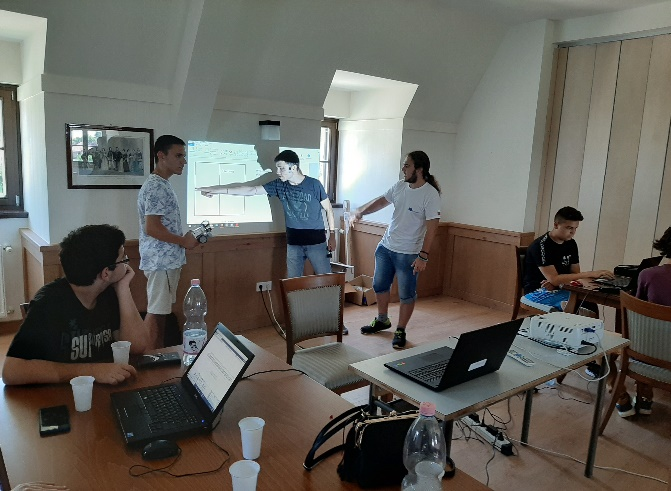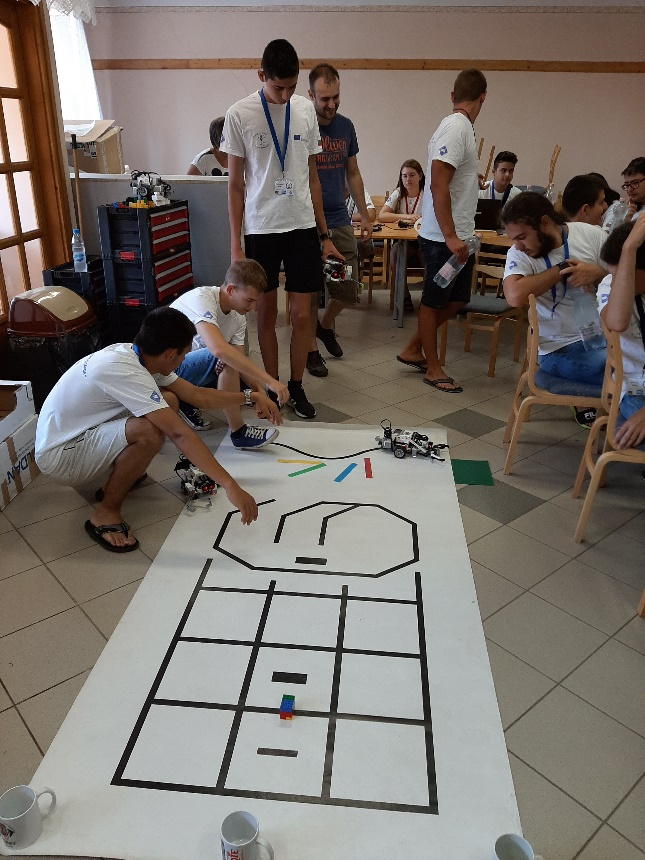
Topic(s) addressed
The project’s main objectives were the acquisition of knowledge and programming skills on EV3 LEGO robots, leading to the consolidation and development of knowledge in fundamental vocational subjects. As a result of this experience, students not only became increasingly familiar with the robot’s abilities, they also gained valuable technological know-how with respect to other forms of new technologies, and the application of the same in educational undertakings. Topics covered by the ‘Come with Us in Roboclass’ project included informatics, and computer and engineering-based technologies such as digital competencies, transparency, and the certification of mobility results.
Target groups
The project’s target group consisted of 20 high school students studying "Application Programming" and "Programming." The student group, consisting of 2 girls and 18 boys, were quick to bond and had a strong sense of continuity due to their wide age range. Two of the participants were Russians who were living permanently in Bulgaria with their families. Also, there were two vocational teachers who were involved in the project.
Methodologies
The project’s results were implemented in vocational subjects including robotics, programming, the Internet of Things, teaching practice, and extracurricular forms of learning. Robotics is one of the most relevant and fascinating ways through which students can gain practical and theoretical knowledge in the technical sciences such as physics, mathematics, information technology, and programming; with robot construction and programming classes being entertaining and interesting for students as they gain knowledge across these different scientific fields. Through LEGO V3, robots were quickly built and various designs tested, with many of the project’s students having taken their first steps into the world of programming through the use of software that was specifically designed to their needs. Robotics education not only introduced the project’s students to basic concepts in engineering and physics, it empowered them to think, make mistakes, create and be original – not to be taught, but to learn for themselves. Indeed, students gained the type of knowledge that would undoubtedly open up many opportunities for them in today’s fast-growing information society. Given the high school’s emphasis on encouraging teamwork from an early stage, students were requested to construct and programme robots that performed socially relevant missions as their first research activity. Younger students were taught by their seniors (who were already competent in robotics), thus highlighting the active roles that students play throughout the learning process. Following completion of the project’s activities, the number of integrated students and teachers in this area had increased by 30%, with effective cooperation having been established with students’ parents with regard to research activities. Students from grades 8 to 12, along with their parents, were interested in joining extracurricular robotics activities, and also participated in robotics knowledge building and competitions.
Environments
A new subject – LEGO Robotics – was defined and introduced into Extended Vocational Education classes during the 2019/2020 school year. Now in its third year, this innovative teaching and learning approach to robotics has since been successfully implemented, and, under the "Innovation in Action" project platform, been used to foster cooperation with vocational schools from other cities. Moreover, we have held robot demonstrations and presented our school’s experience in this field during experience exchange meetings with said schools.
Teachers
Teachers have had their professional qualifications improved, which have allowed us to apply gained experience in our classrooms – thus raising the high school’s prestige in the public domain. At the end of the project, a robotics interest club was established as an extracurricular activity, which resulted in the formation of the school’s robotics team. Since its inception, not only has the high school’s robotics team participated in various competitions, they have gone on to win prizes in each and every competition that they participated in. Additionally, two young high school teachers also joined a course on LEGO robots.
Impact
Following the project, the high school’s teachers prepared a proposal for the development of an innovative robotics classroom, which was approved by the Ministry of Education and the Science Innovative Schools Programme. Teams of teachers and students were then formed to learn about, and work in, robotics – following which they participated in a number of competitions. Innovative techniques, as well as methods in learning and teaching were also introduced for subjects in vocational education, information, and communication technologies. Teachers learnt how to easily create interesting and accessible tasks for students, construct different robots through EV3 programming, utilise different sensors, and record large amounts of data. Furthermore, teachers learnt how to increase students' motivation through the use of new technologies, resulting in improved knowledge of algorithmic and critical thinking, programming, and the overall use of new technologies. Two senior students also shared their experiences with younger students in the interest of enhancing their knowledge in the field of robotics. As a result of the project, students were encouraged to develop their own projects using LEGO robots, with 30+ students having developed personal projects, and 20+ projects having been developed within the framework of academic disciplines. Overall, students’ performance excelled at robotics fairs, hackathons and competitions.
- Reference
- 2018-1-BG01-KA102-047020
- Project locations
- Bulgaria
- Project category
- VET schools
- Project year
- 2021
Stakeholders
Participants
Kállósemjéni Diákokért és Ifjakért Egyesület
- Address
- Hungary

